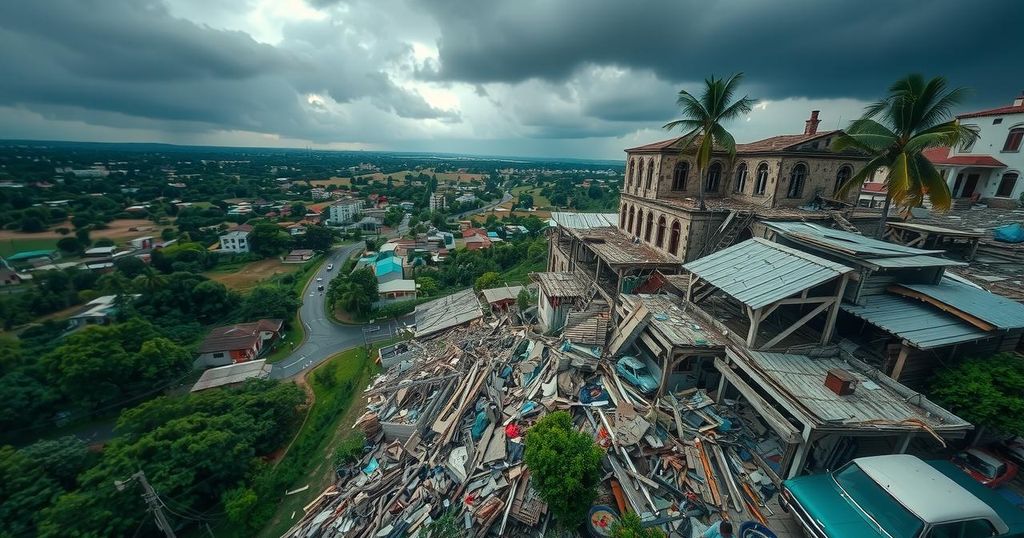Global news
ASSOCIATED PRESS, BARTOLOME MASO, CHILE, CUBA, EMERGENCY RELIEF, EMERGENCY RESPONSE, GR, GRANMA, GRISELDA FERNANDEZ, HURRICANE BERYL, JAMAICA, MIGUEL DIAZ - CANEL, NATURAL DISASTER, NATURAL DISASTERS, NORTH AMERICA, OSCAR, RAFAEL, REUTERS, SANTIAGO, SANTIAGO DE CUBA, SOUTH AMERICA, THE ASSOCIATED PRESS, UNITED STATES GEOLOGICAL SURVEY, USGS, YO, YOLANDA TABIO
Leila Ramsay
0 Comments
Cuba Faces New Crisis as Earthquake Strikes Amid Recovery from Storms
An earthquake with a magnitude of 6.8 struck eastern Cuba, complicating recovery efforts from recent storms that caused power outages and property damage. Although no injuries or deaths have been reported, President Miguel Diaz-Canel highlighted the need for immediate assessments as the nation grapples with its vulnerable infrastructure and economic challenges.
A robust earthquake with a magnitude of 6.8 shook eastern Cuba on Sunday, compounding the difficulties faced by a nation already struggling to recover from recent storms and power outages. The United States Geological Survey (USGS) indicated that the epicenter was located approximately 40 kilometers south of Bartolome Maso. Fortunately, there have been no reported fatalities or injuries thus far. Cuban President Miguel Diaz-Canel announced that assessment efforts were underway in the impacted regions, particularly in Santiago de Cuba and Granma, where landslides, destruction of homes, and damaged power lines were noted. He emphasized the immediate priority to conduct assessments with a pivotal focus on saving lives. Residents described the earthquake as one of the most powerful they had ever experienced, with buildings trembling and many individuals remaining apprehensively at their doorways. State media illustrated images revealing the devastation, including collapsed terracotta roofs and structural impairments in concrete block homes, highlighting the vulnerability of the older infrastructure commonly found in the region. The USGS reported that the quake’s effects were also felt in neighboring Jamaica, underscoring its widespread impact. This seismic event follows a series of natural disasters in Cuba, exacerbating the existing issues tied to infrastructure and economic challenges. Earlier, Hurricane Oscar had inflicted substantial damage, resulting in six fatalities and extensive power outages, while Hurricane Rafael recently disrupted electricity for over ten million individuals, leading to further displacement and destruction. The sequence of calamities reveals a pressing need for comprehensive disaster preparedness and recovery strategies in Cuba.
Cuba, an island nation in the Caribbean, has been increasingly vulnerable to natural disasters, particularly hurricanes. Recent events, such as Hurricane Oscar and Hurricane Rafael, have devastated communities, causing widespread power outages and significant infrastructural damage. The country’s infrastructure—including homes and public services—has struggled to withstand such crises, compounded by economic pressures. Additionally, Cuba has a history of seismic activity, with many residents living in older structures that may not meet modern safety standards, increasing the risk during earthquakes.
In summary, the recent 6.8-magnitude earthquake has further complicated recovery efforts in Cuba, which is still reeling from previous storms that caused extensive damage and humanitarian challenges. The prioritization of recovery efforts and damage assessments is essential to address the immediate impacts and to enhance the resilience of the nation against future disasters. Comprehensive planning and infrastructural improvement are needed to mitigate the effects of both natural disasters and economic instability in the country.
Original Source: www.aljazeera.com




Post Comment